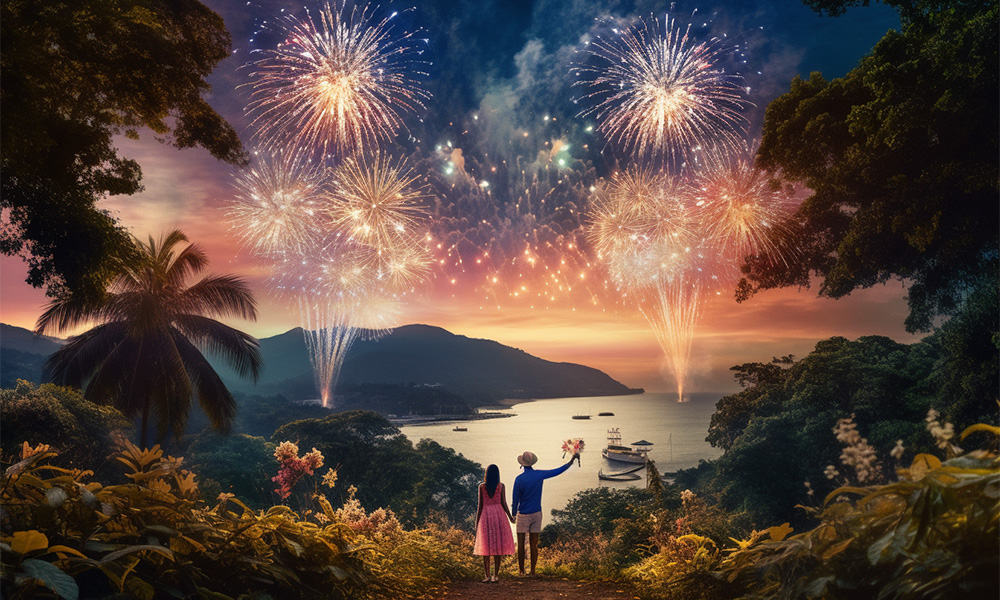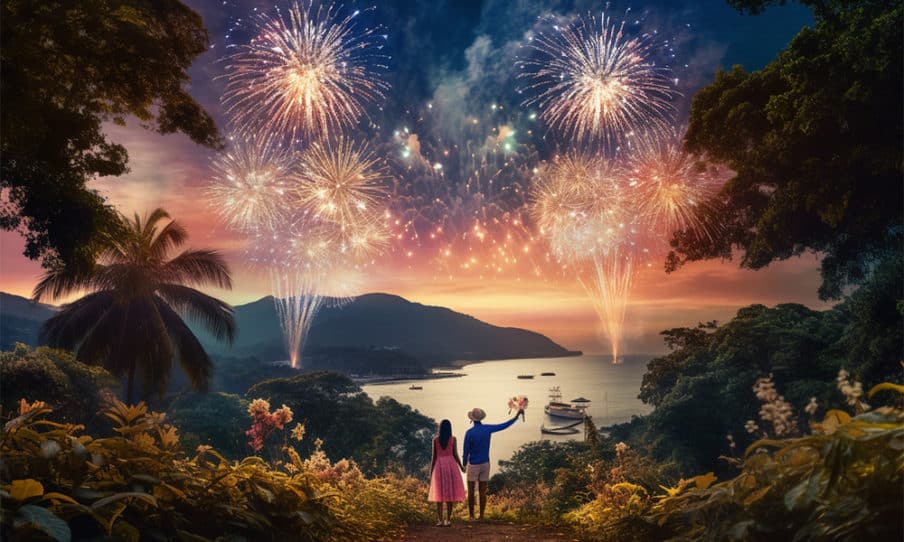
Costa Rica’s holidays burst with vibrant traditions, uniting locals and captivating visitors in a celebration of culture, history, and community. From the dazzling fireworks of New Year’s Day to the sacred processions of Holy Week, these festivities offer a window into the heart of Costa Rican life.
This article explores the five most significant holidays in Costa Rica: New Year’s Day, Holy Week, Labor Day, Independence Day, and Christmas. Whether you’re planning a trip or simply curious about Costa Rican culture, these holidays showcase the nation’s warmth and spirit. Read on to discover what makes each celebration unforgettable and plan your visit to experience them firsthand!
1. New Year’s Day (January 1)
New Year’s Day holds great significance in Costa Rica as it marks the beginning of a fresh chapter filled with hope and aspirations. As the clock strikes midnight, Costa Ricans join together to bid farewell to the old year and welcome the new one with enthusiasm and optimism. The celebration is characterized by lively festivities, gatherings, and traditions that reflect the spirit of unity and renewal.
One of the most prominent traditions on New Year’s Day in Costa Rica is the vibrant display of fireworks that lights up the night sky. The dazzling colors and sparkling lights symbolize the excitement and anticipation for the year ahead. Families and friends come together to witness these breathtaking displays, creating unforgettable memories.
Another cherished custom is the tradition of making New Year’s resolutions. Costa Ricans reflect on the past year and set goals and aspirations for the upcoming one. It is a time for self-reflection and personal growth, where individuals strive to improve themselves and their lives.
In Costa Rica, New Year’s Day is also a time for family and community gatherings. People come together to share special meals, exchange wishes and blessings, and express gratitude for the blessings of the previous year. The atmosphere is filled with laughter, love, and a sense of togetherness.
As the new year dawns, Costa Ricans embrace the belief that it brings new opportunities and possibilities. It is a time to leave behind any negativity and embrace a fresh start. The warmth and optimism of the Costa Rican people shine through as they welcome the new year with open hearts and a spirit of hope.
New Year’s Day for Costa Ricans is not just a holiday; it is a time to embrace new beginnings, strengthen bonds, and cherish the beauty of life. It is a day of celebration, reflection, and anticipation for the wonderful experiences that lie ahead.
2. Holy Week (March or April)
Holy Week, observed in Costa Rica during the month of March or April, holds immense cultural and religious significance for the country’s predominantly Catholic population. This sacred period commemorates the final days of Jesus Christ’s life, including his crucifixion and resurrection, and is marked by various solemn and long traditions.
Throughout Holy Week, Costa Ricans participate in religious processions and reenactments that depict the events leading up to Jesus’ crucifixion. These processions involve carrying ornate statues and religious icons through the streets, accompanied by devout worshippers dressed in traditional attire. The atmosphere is one of reverence and devotion, as people gather to pay homage to their faith and reflect on the sacrifice of Jesus.
One of the most notable traditions during Holy Week is the creation of intricate sawdust carpets, known as “alfombras,” which are meticulously designed and meticulously crafted using colorful dyed sawdust. These carpets, often adorned with intricate patterns and religious symbols, are carefully laid out on the streets to serve as a path for the processions. The bright colors and detailed designs create a visually stunning display, adding to the solemnity and beauty of the occasion.
In addition to the religious observances, Holy Week in Costa Rica is also a time for families to come together and enjoy a break from work or school. Many Costa Ricans take advantage of the holiday to travel and explore the country’s natural beauty, visiting beaches, mountains, and other scenic locations. It is a time of relaxation, reflection, and quality time spent with loved ones.
Holy Week in Costa Rica encapsulates the rich religious heritage and cultural traditions of the country. It is a time for deep spiritual reflection, artistic expression, and community connection. Whether through religious rituals or family gatherings, Costa Ricans honor their faith and celebrate the significance of this sacred period in their own unique and heartfelt ways.
3. Labor Day (May 1)
Labor Day, celebrated on May 1st, holds great importance in Costa Rica as a day dedicated to honoring and recognizing the contributions of workers across the nation. This public holiday serves as a reminder of the value and rights of the labor force, promoting solidarity and advocating for fair working conditions.
On Labor Day, Costa Ricans gather in various cities and towns to participate in parades, rallies, and other public events organized by trade unions and labor organizations. These gatherings serve as platforms for workers to voice their concerns, advocate for their rights, and highlight the achievements and struggles of the labor movement.
The celebrations also showcase cultural performances, including music, dance, and theatrical displays that highlight the spirit of unity and empowerment. It is a day when workers from different sectors come together, demonstrating solidarity and highlighting the importance of collective action.
Labor Day in Costa Rica is not only a time for workers to advocate for their rights but also an opportunity to reflect on the progress made in labor legislation and social policies. It serves as a reminder of the ongoing efforts to improve working conditions, ensure fair wages, and promote social justice.
Moreover, Labor Day in Costa Rica is also a time for relaxation and leisure. Many people take advantage of the holiday to spend time with family and friends, enjoying picnics, barbecues, and outdoor activities. It is a day to appreciate the hard work and dedication of workers while also fostering a sense of community and unity.
4. Independence Day (September 15)
Independence Day in Costa Rica, celebrated on September 15th, holds deep historical and patriotic significance for the nation. It commemorates the day when Costa Rica, along with other Central American countries, declared its independence from Spanish rule in 1821. This important holiday is marked by a range of festivities, traditions, and expressions of national pride.
On Independence Day, Costa Ricans gather in cities, towns, and villages across the country to celebrate with parades, concerts, fireworks, and cultural events. The streets come alive with vibrant displays of national symbols, including the Costa Rican flag and traditional attire. Children, adults, and even pets proudly wear the colors of the flag – red, white, and blue – to demonstrate their love for their country.
The celebrations often include music, dance performances, and traditional folklore, showcasing the rich cultural heritage of Costa Rica. Schools, community organizations, and government institutions actively participate in the festivities, organizing marches and artistic presentations that highlight the country’s history and achievements.
Independence Day is not only a day of celebration but also a time for reflection and appreciation of Costa Rica’s journey as an independent nation. It serves as a reminder of the sacrifices made by those who fought for freedom and the ongoing efforts to uphold the principles of liberty, democracy, and national unity.
Additionally, Independence Day provides an opportunity for Costa Ricans to reaffirm their sense of identity and belonging. It is a day to recognize and celebrate the unique cultural, social, and environmental characteristics that make Costa Rica a special place. Many people take the opportunity to engage in acts of service, volunteerism, and community-building as a way to contribute to the betterment of their nation.
5. Christmas (December 25)
Christmas Day holds a special place in the hearts of Costa Ricans as a time of joy, family gatherings, and religious observances. This holiday, deeply rooted in traditions and customs, brings the nation together in a spirit of unity and merriment.
In Costa Rica, the Christmas season officially begins on December 1st and is marked by vibrant decorations, festive lights, and the iconic nativity scenes known as “portales.” Homes, streets, and public spaces are adorned with colorful lights, wreaths, and ornaments, creating a magical atmosphere throughout the country.
One of the most cherished traditions during Christmas is the celebration of “La Novena.” For nine consecutive nights leading up to Christmas Eve, families and friends gather to recite prayers, sing carols, and enjoy traditional foods and drinks. This tradition strengthens bonds and emphasizes the importance of togetherness and faith during the holiday season.
Costa Ricans also have a unique tradition called “El Tope,” a horse parade that takes place in the capital city of San Jose on Christmas Day. Thousands of riders dressed in traditional attire fill the streets, showcasing the country’s equestrian culture and adding an exciting element to the festive celebrations.
Another integral part of Christmas in Costa Rica is the delectable cuisine. Families come together to prepare and savor traditional dishes such as tamales, arroz con pollo (rice with chicken), and rosquillas (cornmeal cookies). These culinary delights are enjoyed alongside eggnog, called “rompope,” and other seasonal beverages.
Religious observances play a significant role in Costa Rican Christmas traditions, with many attending midnight Mass, known as “Misa de Gallo.” Churches are beautifully decorated, and the Mass is a solemn yet joyous occasion, filled with hymns and prayers, commemorating the birth of Jesus.
Overall, Christmas Day in Costa Rica is a time of celebration, reflection, and gratitude. It is a moment when families come together, traditions are upheld, and the values of love, generosity, and goodwill are embraced. The festive ambiance, the shared meals, and the expressions of faith make Christmas in Costa Rica a truly magical and cherished experience.
Final Thoughts
From New Year’s Day to Christmas, each holiday in Costa Rica holds a special place in the hearts of its people. These celebrations not only provide an opportunity to honor religious beliefs, historical milestones, and cultural values but also foster a sense of unity and belonging within the Costa Rican community.
As we embrace the spirit of these festivities, we gain a deeper understanding of the vibrant traditions and the rich heritage that make Costa Rica a truly remarkable country.

